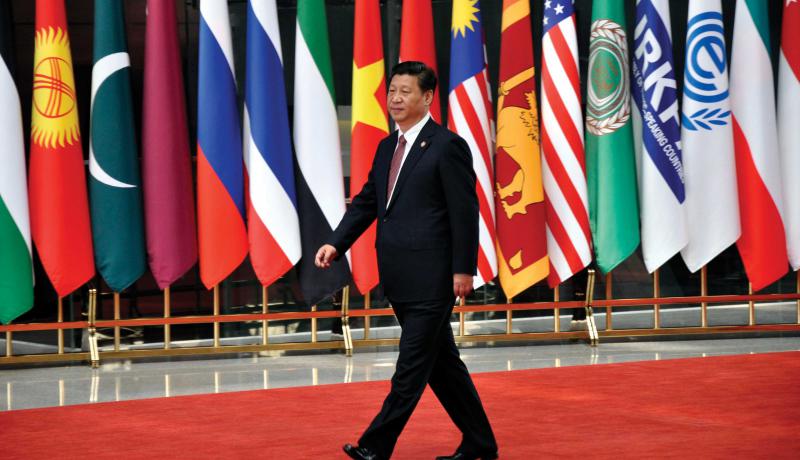China’s pursuit of peaceful diplomacy
Since the institutionalisation of Two Sessions in 1978 till date, what has never changed and succumbed to global challenges is China’s constant foreign vision and sustainable international relationship with world.
In the history of five decades, the brainy Two Sessions remains a beacon of light and forms the base of resilience of China’s foreign policy, allowing it to stand composed and persistent at all costs. Despite venomous hostility orchestrated by some international forces, China foreign policy is restrained and never pursues a retaliatory strategy. Instead of fighting blow to blow, China’s international ties have laid the foundation of lasting peace, friendliness and multilateral cohesion centred on respect to each country’s sovereignty, governance system, economic models and social practices.
Under the guidelines of Two Sessions, a sustainable and emboldened foreign policy is working well. As a result, most international actors attempting to malign China are thinking of mending their ways. Meanwhile, international friends are in hand in glove with China to bolster global harmony.
In today’s world when threats of a “new cold war” against China are dangling with attempts to silencing CGTN’s voice, Chinese State Councillor and Foreign Minister Wang Yi came up with a way forward on the sidelines of the fourth session of the 13th National People’s Congress in Beijing, asking questions to media on China’s foreign policy and relations.
On COVID-19 fight and China response to global public good, his views explained how China carried out its largest emergency humanitarian action since the founding of the People’s Republic of China in 1949, making contributions to the anti-coronavirus efforts of the world.
As Chinese lawmakers deliberate on a draft decision on improving the electoral system of the Hong Kong Special Administrative Region (HKSAR), Wang voiced support for the move.
In order to boost Chinese diplomacy and amicability around the world, China has stirred up a strong tradition to celebrate its diplomatic ties with every country. In this regard on February 2, both China and Pakistan launched their celebrations to commemorate the 70th year of Sino-Pak diplomatic relations. The commemorations that came at the heels of Two Sessions are of great importance as they convey the message that the relationship encompassing 1951-2021 never lost its sheen. Pakistan became the third non-communist country, and the first Muslim one, to recognise the People’s Republic of China in 1950. The two countries established formal diplomatic relations on May 21, 1951. It is a beauty of Chinese diplomacy that despite undergoing many ebbs and flows on global issues, China did not change its foreign policy and provided all assistance and cooperation to Pakistan on its diplomatic endeavours in the world. Both are now all-weather friends, trading allies and strategic partners.
The annual mega gatherings of NPC and CPPCC, known as a window to discern concepts and action plans designed by top-notch legislative and advisory bodies, is the epitome of China’s diplomatic face to the world. Setting the tone of the way forward about Chinese diplomatic blueprints, Two Sessions also help facilitate the international community to understand the global perspective of Chinese President Xi Jinping, which goes beyond traditional theories on international relations, which find it harder to interpret today’s world, as views such as the zero-sum game ideology don’t conform with the trend of the times.
The Two Sessions that kicked off on March 4 flexed its intellectual muscles to make thought-provoking headways. Since becoming General Secretary of the CPC Central Committee in November 2012, Xi has used bilateral or multilateral diplomatic occasions to propose a series of ideas and visions on what kind of relationship China should have with the rest of the world and how it will work to build such a relationship.
In his diplomatic insights, Xi thinks countries should forge partnerships in which they treat each other as equals and engage in mutual consultation and understanding, create a security architecture that features fairness, justice, joint contributions and shared benefits, and promote open, innovative and inclusive development that benefits all.
Two Sessions are also an encapsulation of Xi’s diplomatic perspective which anchors the Belt-and-Road Initiative to promote international cooperation for common development. By the end of January, 138 countries and 30 international organisations have signed 200 cooperation documents with China on jointly building the Belt and Road.
In 2019, trade in goods between China and BRI partners topped $1.3 trillion, up by 6 percent year-on-year. Despite the COVID-19 pandemic, trade between China and BRI partners in the first quarter of this year rose by 3.2 percent, and direct investment by China increased 11.7 percent on a yearly basis, according to the Foreign Ministry.
If analysed, the iconic plenary meeting, also known as Lianghui, which has been taking place over the last many years, introduces the world to China’s diplomatic trends and tenets which China has unswervingly pursued; an independent foreign policy of peace. Two Sessions propagates that the basic objectives of the foreign policy centre on safeguarding national independence and state sovereignty, and creating an international environment favourable to its reform, opening and modernisation efforts, as well as maintaining world peace and promoting common development.
Chinese envoy Zhao Shiren urges students to uphold integrity and strengthen China-Pakistan ties
LAHORE:The Consul Generals from several countries and other distinguished guests attended …











